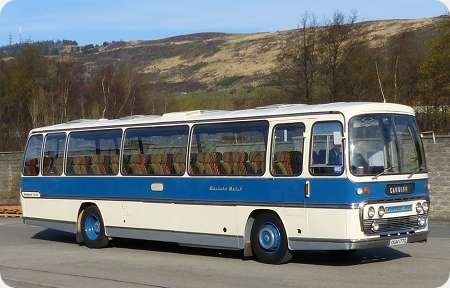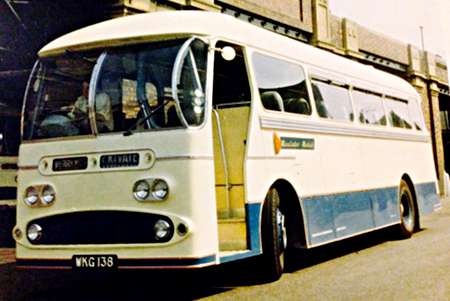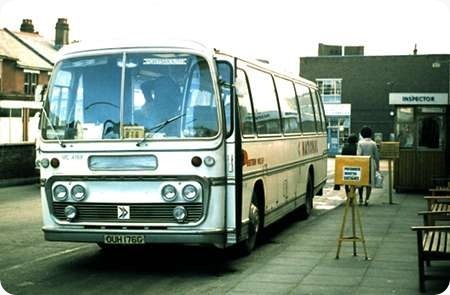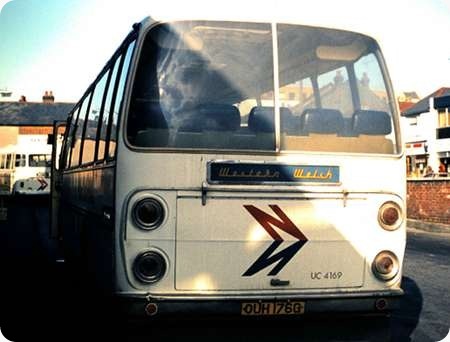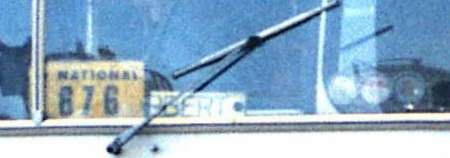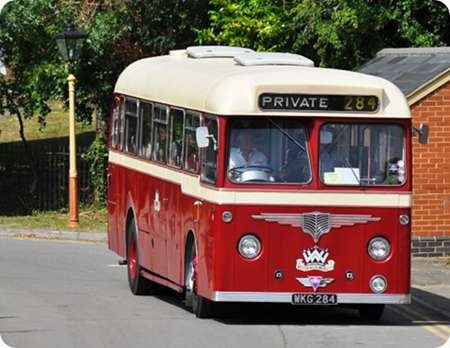Western Welsh – Leyland Leopard – OUH 177G – 177
Western Welsh
1969
Leyland Leopard PSU3A/4RT
Plaxton C49F
Western Welsh buses ran in a maroon livery however this smart blue and ivory was applied to coaches for a period. OUH 177G is a preserved example of the Leyland PSU3A/4RT (900597) with Plaxton Panorama Elite C49F coachwork (693263). The batch of six delivered in April 1969 were fitted with a five-speed semi-automatic gearbox and two-speed rear axle. This one is seen at the 2016 Swansea Bus Museum Running Day.
Photograph and Copy contributed by Les Dickinson
25/04/16 – 18:05
I’m surprised nobody else has commented, Les. Very nice view, and thanks for posting. I’ve been doing battle with my computer system [going back to a Windows machine from an Apple] otherwise I would have commented before.
I’m still not finished and am currently trying to get some backup copies restored by my local photographic dealer. (Most have copied happily, some have been reluctant to do all their contents and a few won’t do anything!)
It’s very pleasant to see a Western Welsh coach in "proper" colours rather than the white paint carried by her sister 176G, which I had published one these pages some while ago.
Pete Davies
28/04/16 – 07:10
I have attached a photo of Western Welsh WKG 138, an AEC Reliance 470 with a Weymann C39F body new in May 1961. It was on hire to PMT in May 1970 along with several others of the batch and is pictured outside Stoke No 1 Garage. I think this body style was unique to Western Welsh and (to my mind) could hardly be described as attractive. Hope this is of interest.
(A rather younger version of IW is in the driving seat!!!)
Ian Wild
29/04/16 – 06:13
Ian, you described the looks of WKG 138 very tactfully, although it does have its charms despite (to my eyes) looking somewhat like a frog wearing safety goggles. It must be admitted that 177 certainly leaves it standing in the beauty stakes though. The Plaxton coachwork looks simply stunning in Western Welsh’s cream and blue livery. Interesting that the Company chose blue rather than red or maroon for the coach livery. I wonder what the reasoning behind it was.
Brendan Smith
29/04/16 – 07:55
Its a shame that they had to bend the windscreen panels to fit them in.
Joe
02/05/16 – 06:43
Brendan, I believe that "powder blue" was the livery of WWOC’s predecessor South Wales Commercial Motors – although why WWOC decided to adopt it as their coach livery . . .
Philip Rushworth
02/05/16 – 14:03
Brendan’s description "a frog wearing safety goggles" is brilliant ! I can see exactly what he means.
John Stringer
02/05/16 – 14:04
Thanks for the information Philip. It’s certainly an attractive shade, especially when matched with cream/ivory.
Brendan Smith
07/05/16 – 17:31
I was never lucky enough to drive an Elite like this – when I started PSV driving in 1979 it was Supremes that we had at Salopia and then Shearings.
But when I did my HGV training at Bassetts at Stone in the 1990s they still had a few Elites older than this one (ISTR a "D" registered one at least) running around on schools contracts. I asked if they would sell me one but they said "no" on the grounds that with them being 45 instead of 53 seats, they were easier to turn into school driveways.
But out of interest, where would anyone go (apart from eBay) to find something like this for sale these days. I’d love to have my own old "Plackie" to go on day trips out.
Eric Hall
08/05/16 – 05:58
Eric – your best option is probably to buy a copy of "Bus & Coach Preservation" and keep an eye on the adverts section. It is published monthly, and I think that Plaxton Elites come up occasionally (I cannot see any in the current issue). To the best of my knowledge, the earliest Elites were G-suffix registrations. I’m not an expert, but my understanding is that the structure is not always as good as the vehicle might look – and certainly not as solid as an ECW body!
The Western Welsh blue and royal ivory coach and DP livery was actually quite short lived. It first appeared in 1965, and all new coaches and DPs delivered from 1965 to 1971 were delivered in it, as well as the 1972 coaches. Older vehicles were repainted in the blue/ivory during that period, but by 1972, the company had reverted to dark red and cream for DPs. Towards the end of the period, the fleetname was replaced with a large block lettered variety. I seem to recall reading that the shade of blue was known as "peacock".
Nigel Frampton
09/05/16 – 16:49
I have just bought a J reg Elite. Certainly they were renowned for drooping behind the rear axle and mine was no different. 60 man hours and some steel later all sorted and MoT obtained.
Roger Burdett
10/05/16 – 06:47
When you refer to the solidity of ECW body designs, Nigel, I assume that you do not include the B51 in that description, though much of the blame lay with Leyland. The B51 was designed for the RE, but Leyland decided to fit it to underfloor engined chassis with no proper rear chassis support for the boot area.
Roger Cox
11/05/16 – 06:27
Well, Roger, I was thinking more of contemporaries to this Western Welsh vehicle, for example the first style of coach body on a Bristol RELH chassis. Those were definitely solid!
Unfortunately, under Leyland’s influence, and possibly a more general pressure to cut costs, the quality deteriorated in later years, and I have read somewhere that, for example, the second type of RELH coach body was also not as solid as its predecessor. But I agree, the B51 was poor – perhaps, the exception that proves the rule!
Nigel Frampton
11/05/16 – 06:28
The Elite is most correctly described as the ‘Panorama Elite’ although as time went by the ‘Panorama’ was dropped in everyday speak. The earliest examples were G-reg, restyling seeing the introduction of the Panorama Elite II and Panorama Elite III, the final examples being P-registered. When grant doors etc were specified, the word ‘Express’ was added to the body designation eg: Plaxton Panorama Elite II Express, which probably accounts for the general term ‘Elite’!
Philip Lamb
Quick links to the - Comments Page - Contact Page - Home Page
